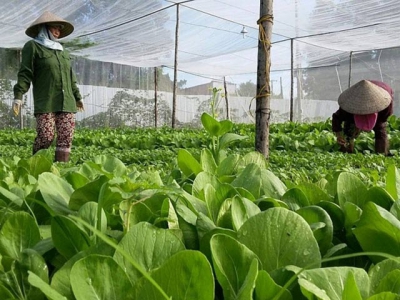Market still opens for organic agricultural exports

Organic agricultural goods are not only consumed in the domestic market, but also exported to many major markets like the US and Japan.
Localities need to clearly define which regions can produce organic and which areas still maintain non-organic production methods. Photo: ST
Export to 180 markets
Referring to organic agriculture, Minister of Agriculture and Rural Development Nguyen Xuan Cuongsaid that production and consumption of organic agricultural products is a trend around the world, especially in the last 10 years.Currently, the total area of organic cultivation in the world is about 71 million hectares, equivalent to 1.5% of the total cultivated area. Some countries such as the US, Australia and Europe (EU) have very fast growth rates of organic agriculture production.
Not standing outside the general "flow", in the last four years, Vietnam has accelerated the formation of an ecosystem of organic agricultural production. Notably, at the end of June, the Prime Minister approved the organic agricultural Development Project for the 2020-2030 period, creating a legal framework and overall plan for organic agriculture production.
Mr. Nguyen Quoc Toan, Director of Department of Agricultural Product Processing and Market Development (Ministry of Agriculture and Rural Development), added that by the end of 2019, the organic farming area in our country has reached about 237,000 hectares, a sharp increase compared to 53,000 hectares in 2016. Currently, 46 out of 63 provinces are implementing and have an organic production movement.
The number of farmers participating in organic production nationwide is 17,168; 97 enterprises work in this sector; 60 enterprises participate in exporting organic products with an export turnover of about US$335 million per year.
“Products of Vietnam organic agriculture are consumed domestically and are currently exported to 180 countries around the world, including the US, EU, China, Japan, Germany, UK, Korea, Russia, Singapore, France and Belgium,are the largest consumers of organic agricultural products in the world. This is a very positive initial result and demonstrates the trend of rapid spread of organic agricultural production in Vietnam,” Mr. Toan said.
According to Mr. Ha Phuc Mich, Chairman of the Vietnam NNHC Association, the organic agricultural sector is developing rapidly. Organic production is getting more and more attention from local authorities, businesses and farmers. At the congress of the party committee, many provinces and cities have been included in the resolution of the economic development in the area.
"These are very good signs, because this is a step towards awareness of the Party committees and local authorities onorganic agriculture," Mr. Mich said.
Careful and sustantive
In spite of achieving many results, in fact the development of administrative complaints in recent years also poses many problems, especially the management, certification, inspection and supervision.
Recognizing that organic production management is very important to ensure organic products, Deputy Minister of Agriculture and Rural Development Tran Thanh Nam said, it is necessary to promote training of managers, inspectors and supervisors of certification organizations and organic agriculture products from ministerial to local levels; improving the quality of human resources for organic production, strengthening the training of specialized experts on industrial chemicals.
Organic production is just one of the modes of agricultural production. Organic agriculture cannot replace other production methods in ensuring food security. Therefore, the development of administrative complaints in localities should be more careful.
"Localities need to clearly define which regions can produce organic products and which areas still maintain non-organic production methods. In terms of products, it is necessary to define which products will be organic products, which products go in the organic direction, and which products still maintain the traditional farming process,” said Deputy Minister Tran Thanh Nam.
On developing organic agricultural products, the head of the agriculture sector Nguyen Xuan Cuong added that the Ministry of Agriculture and Rural Development as an agricultural production management agency is implementing the organization to provinces, cities and economic sectors closely coordinating with the Vietnam Association of organic agricultural product to actively implement these tasks.
Specifically, MARD instructs provinces to identify advantageous products, key fields, and regions with advantages in organic production to implement the industrialization model.
Secondly, the Ministry of Agriculture and Rural Development is completing policies and mechanisms to promote all economic sectors to participate in industrial processing; coordinating with the Ministry of Finance and the Ministry of Planning and Investment to ensure resources in policies to encourage all economic sectors, enterprises, cooperatives, and farmers to participate in the production of industrial chemicals.
“In addition, the Ministry of Agriculture and Rural Development also coordinates with seven socio-economic regions to build the industrialization model for each production object such as seedlings, fisheries, timber and medicinal herbs, on a practical basis to spread to mass production; conducting assessments, with recommendations and implementation directions to try to implement this project most actively and effectively in production,” Minister Nguyen Xuan Cuongsaid.
Related news
 Vietnam’s mangoes export volumnes to US doubles
Vietnam’s mangoes export volumnes to US doubles The US has imported twice the quantity of Vietnamese mangoes in Jan-August 2020, indicating a potential for further development in the market.
 Tây Ninh Province to continue looking for investment in agriculture
Tây Ninh Province to continue looking for investment in agriculture Tây Ninh Province will continue to focus on encouraging investment in agriculture for the next five years.
 How to improve processing rate of vegetables and fruits for export?
How to improve processing rate of vegetables and fruits for export? Vietnam needs to quickly build qualified raw material areas, develop machinery and technology and issue appropriate mechanisms to attract businesses